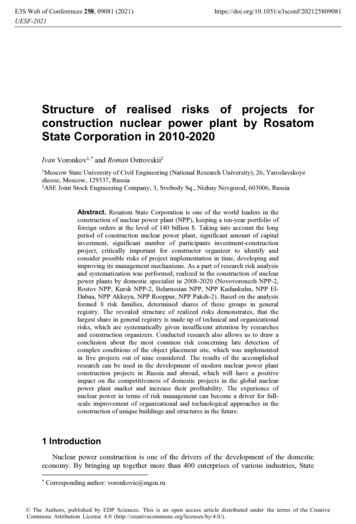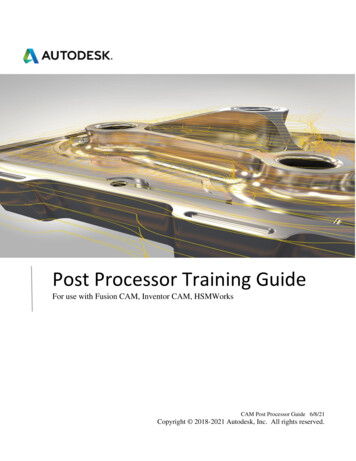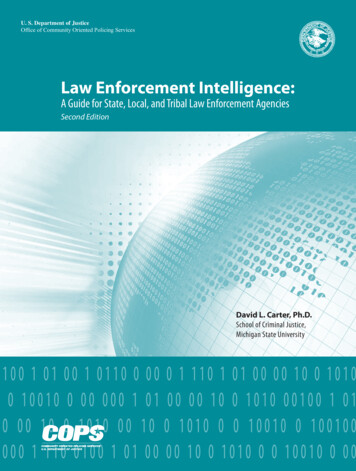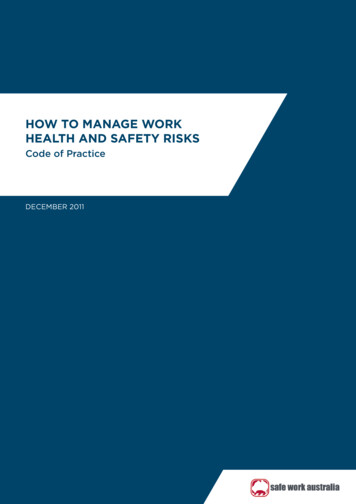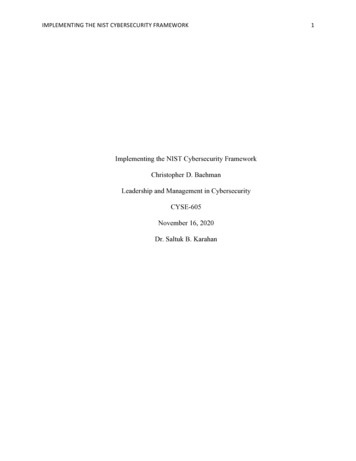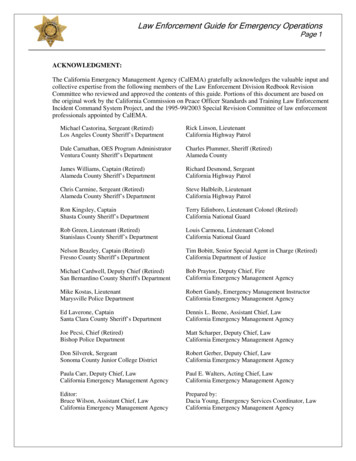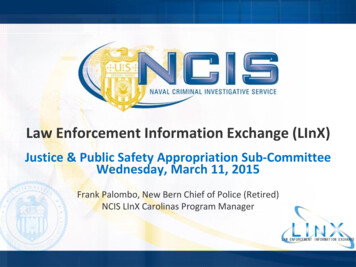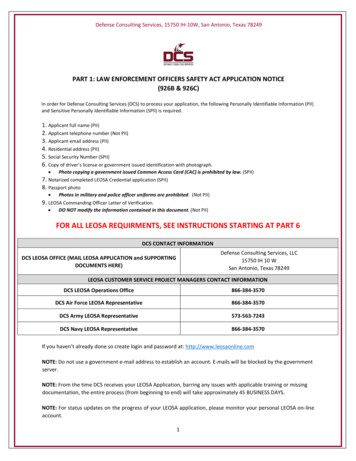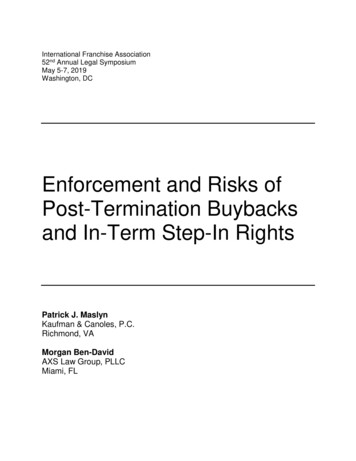
Transcription
International Franchise Association52nd Annual Legal SymposiumMay 5-7, 2019Washington, DCEnforcement and Risks ofPost-Termination Buybacksand In-Term Step-In RightsPatrick J. MaslynKaufman & Canoles, P.C.Richmond, VAMorgan Ben-DavidAXS Law Group, PLLCMiami, FL
Enforcement and Risks of In-Term Step-In Rights and Post-Termination BuybacksTable of ContentsI.INTRODUCTION. 1II.IN-TERM STEP-IN RIGHTS . 1A.Under What Circumstances Can and Should a Franchisor Exercise Step-InRights? . 1B.Considerations and Mechanisms . 3i.Contractual Right Under Franchise Agreement . 4ii.Management Agreement . 4iii.Ancillary Documentation . 9C.Claims Associated with a Franchisor Stepping-In . 9i.Mismanagement and Breach of Fiduciary Duty . 9ii.Lessor Claims Concerning Assumption of Lease .11iii.Other Potential Claims .12iv.Step-in Right as a Defense to Injunctive Relief .12D.Disclosure Requirements . 12E. Practice Tips . 15III. IN-TERM PURCHASE RIGHTS . 16A.Preemptive Rights . 16B.Options . 19C.Disclosure Requirements . 20IV. POST-TERM BUYBACKS AND TAKEOVERS . 21A.Under What Circumstances Can and Should Franchisor Exercise Buyback andTakeover Rights?. 21B.Mechanisms and Ancillary Agreements . 22i.Conditional Lease Assignment .22ii.Purchase of Equipment and Fixtures .23iii.Security Agreement .23iv.Telephone Number Assignment .24v.Other.24C.Enforcing Buyback and Assumption Provisions . 25D.Disclosure Obligations . 28E. Practice Tips . 28V.CONCLUSION . 29
I.INTRODUCTIONThe relationship between a franchisor and franchisee is inherently temporary. Afranchisee is granted the right to operate under a franchisor’s business model for (typically) adefined term. If a franchisee is granted the right to renew the term of its agreement with thefranchisor, its rights to extend the original term are normally limited. Even during the term of thefranchise relationship, there is always a degree of uncertainty that exists for the franchisorbecause the operation of the business is dependent upon another party – the franchisee. If thatrelationship sours, or the franchisee defaults, or if the franchisee cannot continue to operate thebusiness for some reason, the continued operation of the business at the franchisee’s locationmay be in jeopardy. So, eventually, nearly all franchise relationships will reach a point where thefranchisee’s rights to operate the business will end, and the franchisor must face a number ofquestions relating to what should be done with the franchisee’s unit. Is the location still a goodlocation for the brand? Is it profitable? If not, could it be? If the business closes, will there bedamage to the brand? Does the franchisor still want to be in the business of franchising?If the franchisor decides that keeping the business operating at the franchisee’s locationis in its best interests – and the best interests of the brand – it may elect to take over the operationof the business at the franchisee’s location. To do so, franchisors typically incorporate severalcontractual rights into their franchise agreements (or ancillary agreements) intended to enablethe franchisor to take over the operation of the franchisee’s business. This paper attempts to: (1)identify and explain some of the key mechanics of the franchisor’s exercise of these rights undereach of the typical circumstances that give rise to them, (2) highlight the risks, difficulties andopportunities that exist in the event the franchisor elects to exercise them, and (3) note importanttips for franchisors, franchisees and their counsel in preparing for and implementing the exerciseof these rights.II.IN-TERM STEP-IN RIGHTSA. Under What Circumstances Can and Should a Franchisor Exercise Step-InRights?It is common for franchise agreements to contain provisions granting the franchisorthe right to assume operation and/or management of a franchisee’s business during theterm of the franchise agreement under certain circumstances. Examples of commonevents triggering a franchisor’s contractual step-in right include: Death or disability of the franchisee or franchisee’s owner;11See, e.g. Ultimate Fitness Group, LLC Franchise Disclosure Document, Franchise Agreement § ntId {DDAFBF6C-E7594D35-9C13-C131C9BD32F2} (“[I]f at any time following death or Disability of you or one of your Owners,we determine that the Studio is not being managed properly according to our System Standards, we or ourdesignee have the right (but not the obligation) to enter the site and assume the Studio’s management forany period of time that we deem appropriate.”).1
Where there is no qualified manager in place to operate the business;Where the franchisee abandons the business or is absent;2If a franchisee’s actions threaten the goodwill or reputation of the franchisor, itsmarks, or the system;During times of a franchisee’s non-compliance or default under the franchiseagreement. 3Ultimately, a franchisor’s objectives in exercising its step-in rights should bedesigned to ensure the continuing operation of its franchises, where possible, and toensure that the brand and others are not detrimentally affected. Depending on theindustry involved, especially where health and safety, or the children or elderly areconcerned, a franchisor may take a more hard-lined approach to taking over control of afranchisee’s business in order to prevent damage to the brand and to third parties. Forexample, Kumon , which offers franchises to operate after-school education centers forchildren, has specifically-crafted step-in rights to take into account the unique nature ofoperating a school and servicing children. Specifically, Kumon ’s franchise agreementgives the franchisor the right to step-in if: (a) the franchisee is absent from the centerwithout making adequate arrangements in advance; or (b) if the franchisee or any of itsowners or employees “is charged with a crime against children or involving moralturpitude” or engages in any conduct that is “susceptible of creating a crisis or immediatesubstantive damage to the Kumon Brand.”4 The management fee charged by Kumon is based on a formula taking into account tuition prices and numbers of students enrolled,while the duration of the management period will be for so long as the franchisee isabsent, or for so long as the public relations crisis has ended, or until a disposition of thefranchisee’s case is reached, as applicable.5 By exercising step-in rights in thesecircumstances, a franchisor is able to not only prevent reputational harm and containpotential risk but can also distance the brand from a franchisee who has engaged inillegal, unsafe, or harmful conduct.Even where a franchise agreement is silent on the issue of a franchisor’s step-inright, there may be situations where it is practical or beneficial for the franchisor tomanage the franchisee’s location for a certain period of time or for so long as thefranchisor deems reasonable. Indeed, in circumstances where a franchisee is in default,See, e.g. Smashburger Franchising, LLC Franchise Disclosure Document, Ex. C – Franchise ch.do?documentId {E05B9D66-0000CF21-B9C1-9C254C0E73FC} (“We (or a third party) may assume the management of your Restaurant . . if you abandon or fail to actively operate your Restaurant.).”).3 Karen Marchiano, Glen Plattner and Leonard Vines, Roadmap for the Default and Termination Process,ABA 35TH ANNUAL FORUM ON FRANCHISING, at 36 (October, 2012).4 Kumon North America, Inc. (“Kumon”) 2017 Franchise Disclosure Document, Attachment 2 – earch.do?documentId {161E47BA-AE574593-85C3-CFD6B4DDA176}. Kumon expressly requires in its Franchise Agreement that a separateManagement Agreement be entered into between the parties if the franchisor assumes operation. See id.5 Id.22
franchisors often explore other alternatives before exercising a right to terminate,depending on the severity and curability of the default and the specific circumstances. Afranchisee faced with the possibility of a looming termination as a result of a default willundoubtedly choose to enter into a management agreement with the franchisor tohandover operations rather than lose the franchised business. In these circumstances,franchisors will inevitably have more leverage in taking over management of afranchisee’s location pursuant to a management agreement with favorable terms, suchthat a franchisor could step-in, even where a franchise agreement is silent.In addition, where a franchisee needs to improve performance, requiresextraordinary assistance, or is under financial distress, a franchisor may decide to stepin for a limited period of time pursuant to the mutual agreement of the parties. 6 In suchcases, the management by the franchisor should be for a defined, interim period andshould be designed with an eye towards either a sale of the franchise or a turnaround ofthe business.7 Where the franchisor does not want to buy back the business, and thereis no other franchisee to purchase the franchise, assuming operations during an interimperiod can serve as a viable solution for the franchisor to preserve the outlet for a futuresale.B. Considerations and MechanismsWhere a franchisor intends to exercise its step-in right during the term of afranchise, the franchisor and franchisee should consider the following questions: What is the ultimate objective?Are there any alternatives?8Who will comprise the management team?Is the franchisor ready and able to takeover?How will costs be covered?Who will bear the risks involved in the operation of the business?How long will the interim management period last?Will the franchisee have any involvement?The parties should also consider whether having the franchisor stepping in violatesany applicable Small Business Administration loan covenants or other agreementsbetween a franchisee’s lender and a franchisee. Because a blanket step-in right wouldviolate the SBA’s covenants, any interim management should be for a short period of time6See Jason B. Binford, Robert F. Salkowski, Andra Terrell, Structured Workouts: Franchisor Strategies forDealing with the Financially-Challenged Franchisee, ABA 38TH FORUM ON FRANCHISING, at 7 (2015).7 Les Wharton and Sharon M. Lewonski, Working with Financially Distressed Franchisees, 31 FRANCHISEL.J. 2, 66, 68 (Fall 2011).8 See generally id. at 66-75 (analyzing alternatives to terminating a financially distressed franchisee,including lending money to the franchisee; offering royalty abatement, reduction or forgiveness; enteringinto a consulting arrangement to provide focused business consulting; or selling the outlet).3
(i.e. in 90 to 120 day increments, but not exceeding 12 months). 9 Alternatively, thefranchisor may consider only assuming limited aspects of the business to alleviate thirdparty concerns.10i.Contractual Right Under Franchise AgreementMost franchise agreements include some form of contractual step-in right. Theseprovisions should, at minimum, state: (1) the circumstances triggering the right; (2) thelength of time the franchisor (or appointed manager) has the right to manage or assumeoperations of the franchised business; (3) whether and to what extent the franchisor isentitled to any additional compensation, usually in the form of a management fee; (4) howthe parties will cover and track revenues and expenses; and (5) the scope of thefranchisor’s duty and liability. By having these express provisions in the franchiseagreement, a franchisor’s step-in right is self-executing, as the parties have alreadyagreed to these provisions. Consequently, upon an event giving rise to an immediateneed to step in to protect the brand or to ensure the continuation of a profitable location,the franchisor is able to exercise the step-in right without an independent agreement.However, as explained below, notwithstanding the existence of a contractual step-in rightin a franchise agreement, it is generally still recommended that a separate managementagreement or similar agreement be executed between the franchisee and the franchisor(or affiliate or third-party appointed manager) to detail the relationship between the partiesand to take into account the unique concerns and circumstances at hand.ii.Management AgreementIf a franchisor assumes operations and management of a franchisee’s location(either pursuant to a franchise agreement’s express provisions or as a result of a mutualdecision between the parties), a management agreement should be prepared to authorizethe franchisor to operate the franchised business on behalf of the franchisee and todelineate the parties’ rights and obligations. While many franchise agreements containexpress language governing a franchisor’s right to step in to take over management oroperations of the franchised business, the parties should still enter into a separatemanagement or other agreement between the franchisee and franchisor (or most often,an affiliate) to separate the manager/owner relationship from the franchisor/franchiseerelationship.11 While many franchise agreements govern a franchisor’s in-term step-inrights to some degree and anticipate that the parties will enter into a managementagreement at the appropriate time, very few franchisors include a default form of amanagement agreement as part of their standard franchise disclosure document, giventhat a franchise relationship generally requires the franchisee to own and operate the9Dennis Wieczorek, Franchise Agreement Provisions That Affect Eligibility for SBA Loans, THE FRANCHISELAWYER, Vol. 15, No. 2, Spring 2012, p.1.10 Binford, supra note 6.11 Nancy G. Gourley and David W Koch, The Other Contracts in the Franchise Relationship, ABA 29THANNUAL FORUM ON FRANCHISING, at 13 (Oct. 2006).4
franchise.12,13 Furthermore, the need for a franchisor to assume a franchisee’s operationsis merely hypothetical at the time when a franchisee receives a franchise disclosuredocument, and the facts giving rise to the need may be highly dependent on thefranchisee’s particular circumstances.Where a franchisor/manager and franchisee enter into a management agreement,the parties should ensure that the following terms are addressed and contained in theagreement: Term. Since in-term management agreements are temporary, the managementagreement should be for a limited period of time, with optional renewal terms, ifany. Indeed, long-term management agreements in franchising are not typical,apart from industry-specific management agreements in hotel brands. The termof the management agreement should likewise be commensurate with thecircumstances and the purpose. If the ultimate objective of entering into amanagement agreement is to turnaround the business with the expectation thatthe franchisee will eventually assume management, then the franchisee shouldattempt to negotiate a right to terminate the agreement prior to expiration.Obviously, such right should be subject to the franchisee meeting certainconditions or criteria and the franchisor being satisfied that the franchisee is ableand competent to independently operate the franchised business. Default, Termination. The management agreement should cover how atermination would affect the franchise agreement, and vice versa. The partiesshould review the franchise agreement to determine whether there are any generalcross-default provisions that would otherwise apply. In addition, the parties shouldconsider the consequences of termination, including what happens to the locationif the objective is not achieved and what kind of post-termination rights thefranchisor has over the location.14 Compensation. The management agreement should expressly state how thefranchisor/manager is to be compensated, with such compensation being inaddition to the royalty fees and other fees due under the franchise agreement.12Moreover, one court has suggested that where a franchisor simultaneously markets its franchiseagreement with a management agreement giving the franchisor exclusive, indefinite control over afranchisee’s business, the relationship may risk transforming from a traditional franchise to an investmentcontract governed by securities laws. See Creative American Education, LLC v. The Learning ExperienceSystems, LLC, No. 9:14-cv-80900, 2015 WL 2218847, at *13-14 (S.D. Fla. May 11, 2015).13 In researching franchise systems that incorporated a default management agreement as part of thecontracts attached to a franchise disclosure document, the authors were able to locate a “SalonManagement Services Agreement,” offered as a voluntary agreement by Ultimate Franchises, Inc. d/b/a18 8 Fine Men’s Salon , pursuant to which a franchisee can opt to have an affiliate of the franchisormanage and supervise the operation of the salon for periods of 180 days. See Ultimate Franchises, Inc.Franchise Disclosure Document, Exhibit K – Salon Management Services Agreement (Jul. 12, 2017),available at s/2018/06/Eighteen-Eight-FDD-2017CA.pdf.14 See Wharton, supra note 7.5
15 Costs and Expenditures. Because there will necessarily be costs involved withthe interim management of the franchised business, the management agreementmust also expressly address how costs will be covered, including amounts andmethods. Generally, the franchisee will be the party responsible for bearing thecosts. These charges can take several forms. For example, the franchisor maypay costs out of the profits of the business during the applicable period.Alternatively, where the objective is to sell the franchised business, a franchisormay agree to pay the costs out of the proceeds of an ultimate sale.15 In someinstances, a franchisor and franchisee may have shared authority and access overthe franchisee’s bank account, while in other circumstances, a franchisor maydecide to open a segregated bank account, over which it will have exclusiveauthority to withdraw funds to cover expenses. The parties should likewiseconsider what will happen if the business does not generate sufficient revenue tocover expenses. In most cases, the franchisor will require that the franchiseecover any shortfalls within a prescribed period of time or may require that aminimum amount of working capital be available. Franchisees, on the other hand,should attempt to ensure that they have the right approve certain expendituresover a specific amount or limit the franchisor’s power to pay expenses to “day-today expenses” that are “standard” or “typical” to perform the manager’s role inoperating the franchised business. Reporting. From the franchisor’s perspective, a franchisee must allow thefranchisor or its appointed manager to perform its duties without interference fromthe franchisee, and the management agreement should include language to thateffect. However, a franchisee will inevitably want some level of communicationfrom the franchisor regarding the performance of the business. A managementagreement should delineate what type of updating or reporting will be required bythe franchisor, if any, and at what level of frequency. The franchisor should furtherrequire that the franchisee expressly agree to provide the franchisor with accessto any necessary files, databases, computer systems, or other information in orderto perform under the management agreement. Employment. Due to concerns of joint-employer liability, a franchisor entering intoa management agreement will generally include a provision detailing the parties’respective responsibilities as they relate to employment matters. Where theemployees of the franchisee will continue to work at the location, the franchisor willbe hiring and/or managing the staff on the franchisee’s behalf. In suchcircumstances, it is imperative to clarify whether staff will remain employees of thefranchisee and who will be responsible for employment arrangements and liabilitywith respect thereto. However, depending on the reason for the franchisor’sdecision to take over the operation of the franchised business, it may also feel thatit is necessary to exercise control over the hiring and firing of the franchisee’s staff.Id.6
Staffing: At a minimum, to operate the franchisee’s business for any period oftime, the franchisor must have the ability to place at least one person in amanagement position to oversee day-to-day operations. The managementagreement should expressly state the franchisor’s obligation as it applies to howmany representatives will be on-site. Allocation of Responsibility: If the franchisor will be responsible for taking overall day-to-day decision making responsibilities, the management agreementshould be clear on this point and reiterate that the responsibilities are beingdelegated in accordance with the franchisee’s operating agreement or bylaws. Ifthe franchisor will only be taking over a portion of the responsibilities for operatingthe business and the franchisee will retain some rights, the managementagreement should be clear on which rights the franchisee will retain and howdisputes about the extent of each parties’ rights will be resolved. Insurance. Before entering into any management agreement and taking over theoperation of a franchisee’s business for any length of time, a franchisor shouldclosely scrutinize the insurance it and the franchisee hold to determine whetherthe existing coverage is sufficient to protect the franchisor from any claims againstit arising out of the franchisor’s operations. If it is not, the franchisor should obtainthe necessary coverage and provide that the cost of that coverage be borne by thefranchisee. Scope; Appointment. Given that the franchisor will be assuming managementand operation of the franchised business on behalf of the franchisee, it isimperative that the management agreement define the scope of the manager’sduties and the parties’ relationship, with the manager having limited agency andacting as an independent contractor. Without clear and express language, anunintended agency or fiduciary duty may arise.16 No Waiver of Default. If the franchisor is exercising step-in rights in lieu oftermination, any management agreement should include an anti-waiver provisionproviding that any forbearance does not constitute a waiver of future enforcementrights under the franchise agreement. Such a clause is designed to protect againstan argument by the franchisee that the franchisor has elected its remedy for anydefault and, therefore, waived its right to terminate.16See, e.g. Ivesdal v. Three Rivers Hospitality, LLC, No. 1:12-cv-073, 2014 WL 12543858 (D.N.D. Feb. 7,2014). In Ivesdal, the plaintiff hotel owner engaged a third party manager to manage operations of afranchised AmericInn hotel pursuant to a management agreement. Id. at *1. Following several years ofoperations, the hotel owner sued for, amongst other things, breach of fiduciary duty, claiming that themanager mismanaged the hotel and cause significant damages. Id. On summary judgment, the courtfound that the language of the management agreement did not support a separate and distinct fiduciaryrelationship, given that the manager’s representation was expressly limited to the scope of authority grantedin the contract itself, which explicitly disclaimed the existence of a principal/agent relationship. Id. at *3.Therefore, the manager was not the hotel owner’s agent and did not owe a fiduciary duty. Id. at *4.7
Release, Limitation of Liability. Whatever the triggering event for thefranchisor’s exercise of its right to step-in and operate the franchisee’s business,it is an opportunity for the franchisor to limit its potential liability for claims that mayhave arisen to that point in the relationship by obtaining a release of claims by thefranchisee, , especially where the management agreement is executed in lieu oftermination. In such circumstances, the management agreement should have anagreement from the franchisee to indemnify, release, and hold harmless thefranchisor and/or manager from any and all existing claims arising under or relatingto the franchise agreement, the management agreement, or the franchisedbusiness. In addition, the management agreement should contain an exculpatoryclause requiring the franchisee to indemnify and hold harmless the franchisorand/or manager for all damages arising from any cause other than fraud, grossnegligence or intentional conduct. Consequently, the franchisor is able to reducethe risk of the franchisee being able to successfully blame the franchisor if themanagement does not yield successful results, so long as the franchisor isperforming pursuant to reasonable, good-faith efforts. Indemnification: Just as the franchisor should ensure that insurance is in placeto properly protect it from any losses arising out of its operations of the franchisee’sbusiness, it should also provide that the franchisee will be responsible for anylosses actually incurred. The franchisor may also wish to obtain guarantees fromthe franchisees principals to support this obligation. Miscellaneous. When preparing the management agreement, the parties shouldensure that the governing law, venue, dispute resolution and enforcementprovisions are consistent with those contained in the franchise agreement. Whilea management agreement can arguably fall within the scope of these provisionscontained in the franchise agreement, it is best to expressly set forth the intended,applicable provisions in writing to eliminate any arguments to the contrary.1717See Tennsonita (Memphis), Inc. v. Cucos, Inc. 1991 WL 66993, at *3 (Tenn. App. May 2, 1991) (forumselection clause contained in franchise and development agreement applying to “any dispute arising out ofor in connection with the franchisor-franchisee relationship” encompassed oral takeover agreement, giventhat it was franchisee’s failure to meet development schedule which, in part, led to the oral takeoveragreement; franchisee’s motion to dismiss denied).8
iii.Ancillary DocumentationThe nature of the franchised business and the structure of the franchisee maysuggest the need for additional documentation. For example, the franchisor may beadvised to obtain a power of attorney in order to demonstrate to a third party’s satisfactionthat it has authority to act on the franchisee’s behalf.18C. Claims Associated with a Franchisor Stepping-Ini.Mismanagement and Breach of Fiduciary DutyWhere a franchisor decides to assume operations of a franchisee’s business, thefranchisor’s actions are generally designed to improve, stabilize or gain control over thefranchised business. On the other hand, franchisees may not want a franchisor to stepin and run their business due to increased costs, loss of control, and potential damage tothe franchisee’s operation.19 Indeed, if the franchised business declines after a franchisorassumes operations and management, who is responsible?In Creative American Education, LLC v. The Learning Experience Systems, LLC,20the plaintiff franchisee (“CAE”) purchased two “The Learning Experience” franchisedcenters as the basis for CAE’s owners to obtain EB-5 investor visas to immigrate to theUnited States.21 However, the owners, who were residents of Singapore, were unable toobtain the visas as expected.22 To ensure the timely buildout and opening of thefranchises, the parties entered into a management agreement and power of attorneygiving the franchisor (“TLE”) the ri
Where there is no qualified manager in place to operate the business; Where the franchisee abandons the business or is absent;2 If a franchisee's actions threaten the goodwill or reputation of the franchisor, its marks, or the system; During times of a franchisee's non-compliance or default under the franchise agreement. 3
